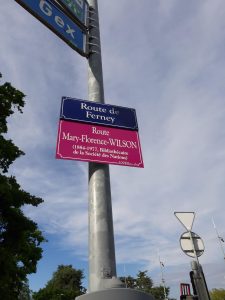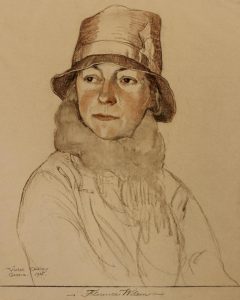 This blog is the result of a street name. Not an official one, but rather an alternative, proposed for the Route Ferney in Geneva, as part of 100elles, an effort to raise awareness – and recognition – of the contribution of women through history.
This blog is the result of a street name. Not an official one, but rather an alternative, proposed for the Route Ferney in Geneva, as part of 100elles, an effort to raise awareness – and recognition – of the contribution of women through history.
The alternative name given in this case is that of Mary Florence Wilson, the first librarian of the League of Nations. 2019 marks both the centenary of her taking on this role (at least in practical terms), one she would hold for eight years, as well as of the library itself.
Reading through her own work – notably her history of the process that led to the League of Nations Covenant[2], as well as her account of her time at the League – she comes across as clear, professional and far-sighted, but not without a sense of humour.
The views of those who worked closely with her are also generally very positive, although she clearly annoyed some of her more misogynistic colleagues. On her death in 1977, the IFLA Annual contained a report from the Association of International Librarians, including from Professor Doris Dale, who noted that ‘contacts with this fascinating personality always enriched everyone who had the privilege to meet her’[3].
Florence Wilson remains a fascinating personality to this day, and very much in the minds of those who continue to serve in the library she set up. IFLA is grateful to them for the support offered in finding the materials for this blog, which will explore just some of the things that make her so interesting a figure.
A Hundred-Year Legacy: Florence Wilson’s Practical Achievements
As the ‘first international librarian’, Florence Wilson was responsible for setting up the library for the world’s first multidisciplinary, multilateral organisation, the League of Nations.
She came from the eastern United States, and held a number of posts at Columbia University, before being recruited by Colonel House, the man US President Woodrow Wilson chose to plan for peace after World War One.
Serving as a member of the American Peace Commission, and liaison officer of the American Library Association and Library of Congress[4], she attended the Versailles Conference, and saw first-hand the efforts of the countries involved to design a new world order.
She clearly impressed those around her, and even before the League of Nations Covenant entered into force, was asked by the Secretary-General to be, Sir Eric Drummond, to organise the library. This was to be the first library serving a global organisation working across a range of policy issues, and with a key role in responding to crises.
This, she reasoned, required a special type of library, bringing together elements of a government or parliamentary library, as well as of a major research library, which could be visited by interested groups[5]. This she did, by all accounts, with energy and vision, as the library moved from small rooms on Piccadilly in London to the Hotel National, on the shore of Lake Geneva.
During her time, the library went from zero to 90 000 volumes[6], establishing itself not just as a key resource and space for the League Secretariat and visiting officials[7], but also as a research library and source for libraries across the continent and the world. Visiting experts underlined that the library as ‘successful and much appreciated’[8]. She did, however, attract the concern of her hierarchy around the expense of the library, but defended this as being essential for it to fulfil its mission[9].
Nonetheless, and strongly focused on ensuring the viability of the library, she invested considerable time in seeking to attract support from external funders, notably the Carnegie Foundation. However, it was only to be under her successor, Tietse Sevensma, that the Rockefeller family would offer the money needed both to start to achieve her vision, and to raise the building that houses the library today[10].
 An Intellectual Contribution: A Prophet of Access to Information
An Intellectual Contribution: A Prophet of Access to Information
Florence Wilson stands out both for her reflection on how to carry out librarianship at the international level, and for her words and writings round the role of information in promoting peace and understanding.
She came to her role at the League conscious of her status as an American (an issue that would become more prominent when the United States chose not to join the League)[11]. At that point, the American approach to librarianship, differed strongly from the European, in particular as concerns the resourcing and organisation of the library.
Therefore, when her original plans to organise the Library along the lines of the Library of Congress were rejected, she travelled around Europe, exploring current practices. She ended up with a hybrid system, with the Dewey Decimal system alongside a card catalogue following American principles. The system worked in two languages too – the card catalogue in English, while shelf list headings were in French[12].
This leads to the more philosophical contribution – her conviction that the library should act ‘so that decisions may be based on fact, and […] express the civilization and culture of the various countries that the peoples of the world will better understand each other, and thru understanding, will be at peace’[13].
She had a strong focus on service, believing that if people could not access information easily, then the mission of the library could not be accomplished[14]. As a result, she strongly promoted the library as an open space, giving visitors the opportunity to browse for themselves (a relatively revolutionary idea in research libraries in Europe at the time)[15], and launched innovative services such as regular messages to Secretariat staff, highlighting the latest research and ideas[16]. She also welcomed visiting groups and researchers, who would otherwise have had no access to many of the materials held.
She argued that what people needed was, primarily, information, not the books that held them, and encouraged her staff to offer help along these lines[17]. This placed her on the frontier of thinking about how international relations work, contributing to the idea that the development of a body of international knowledge could be the basis for successful international cooperation[18].
This is the same logic she took into her work after the League of Nations, promoting libraries in European and the Middle East as instruments of international understanding[19]. Working at a time when the potential of information to support government was only just starting to be recognised, this was a powerful contribution[20].
A Personal Effort: Challenges (Mainly) Overcome
A key feature of many of the pieces about Florence Wilson is the discrimination she suffered, alongside almost all other women. Having taken on the task of organising the library in 1919, it was not until a year later (and the failure to appoint a male Polish candidate for her job) that she was confirmed in her function. She also became the only female library director (aged just 35) in Europe[21].
For the following years, she never rose beyond the rank of Section Head, despite her budget and responsibilities, and even then barely earned a third of her male counterparts[22]. The fact that her staff was predominantly female also led to criticism (not an issue that affected purely male departments), although were partially (although clearly not excusably) saved by the fact that they cost less to employ[23].
While she does not mention this in her own official writings, she clearly was conscious of her sex, and indeed acted as the League of Nations delegate to the International Women’s Suffrage Alliance in 1920, for example[24].
Her departure from the library was, it seems, not by choice. She was dismissed in 1927, apparently on the basis that it was necessary to find a role for the Germans, who had just been admitted to the League – they never provided someone. It could be argued that is it indeed only this departure that prevented her from being a candidate to be the first permanent IFLA Secretary General – it was her successor, Tietse Sevensma, who would take on this role in 1929.
What is clear enough is that even if she had been a man, her achievements would have been notable. They are all the more so for the challenges that she faced, and the fact that as the first to do so many things, she was finding her own way. This work has lasted, and is still continuing in Geneva today.
So as we wish happy birthday to the UN Library in Geneva, it’s also a good time to celebrate the work of the ‘first international librarian’, and hope that that street sign may be made permanent.
[1] International Federation of Library Associations and Institutions (1977), IFLA Annual, Verlag Dokumentation Saur KG, Munich, p146
[2] Wilson, Florence (1928), The Origin of the League Covenant, The Hogarth Press, London
[3] International Federation of Library Associations and Institutions, ibid, p147
[4] Dale, Doris Cruger (1972), An American in Geneva: Florence Wilson and the League of Nations Library, The Journal of Library History, Vol. 7, No. 2, p110
[5] Idem, p112
[6] Idem, p124
[7] Florence Wilson talks of Lord Robert Cecil having tea at a library field, and Arthur Balfour and Léon Bourgeois using library meeting rooms to chat. Wilson, Mary Florence (1922), The Library of the League of Nations, The Library Journal, 15 December 1922, p1060
[8] Idem, p119
[9] Dale, p119
[10] Blazek, Ron and Wilson, Mary Florence (1972), Vignettes of Library History: No. 11, The Library of the League of Nations, The Journal of Library History, Vol. 7, No. 4, p371
[11] Wilson (1922), p1060
[12] Blazek and Wilson, p369
[13] Idem, p1057
[14] Dale, ibid, p113
[15] Dale, ibid, p114
[16] Blazek and Wilson, ibid, p369
[17] Valeska Huber, Tamson Pietsch & Katharina Rietzler (2019), Women’s International Thought and the New Professions, 1900-1940, Modern Intellectual History (2019), https://doi.org/10.1017/S1479244319000131 (pre-print available), p16
[18] Idem, p12
[19] Idem, p15
[20] Idem, p16
[21] IFLA, ibid, p147
[22] Dale, Ibid, p111
[23] Idem, p116
[24] Idem, p122